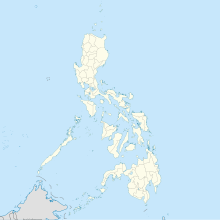Lumbia Airport
|
Lumbia Air Base Paliparang Militar ng Lumbia Tugpahanang Militar sa Lumbia |
|||||||||||
|---|---|---|---|---|---|---|---|---|---|---|---|
| Summary | |||||||||||
| Airport type | Military | ||||||||||
| Operator | Philippine Air Force | ||||||||||
| Serves | Cagayan de Oro | ||||||||||
| Location | Barangay Lumbia, Cagayan de Oro | ||||||||||
| Elevation AMSL | 183 m / 601 ft | ||||||||||
| Coordinates | 08°24′56″N 124°36′40″E / 8.41556°N 124.61111°ECoordinates: 08°24′56″N 124°36′40″E / 8.41556°N 124.61111°E | ||||||||||
| Map | |||||||||||
| Location in the Philippines | |||||||||||
| Runways | |||||||||||
|
|||||||||||
| Statistics (2011) | |||||||||||
|
|||||||||||
|
2012 Philippine Statistical Yearbook
|
|||||||||||
| Passengers | 1,442,959 |
|---|---|
| Aircraft movements | 6,792 |
| Metric tonnes of cargo | 16,166 |
Lumbia Air Base (ICAO: RPML), formerly known as Lumbia Airport and Cagayan de Oro Airport, was the domestic airport that served the general areas of Cagayan de Oro and Northern Mindanao, located in the province of Misamis Oriental in the Philippines. It was the second busiest airport in Mindanao, after Francisco Bangoy International Airport in Davao City prior to the opening of Laguindingan Airport.
The airport was classified as a Class 1 principal (major domestic) airport by the Civil Aviation Authority of the Philippines, a body of the Department of Transportation and Communications that is responsible for the operations of not only this airport but also of all other airports in the Philippines except the major International airports.
Lumbia Airport took its name from its location in Barangay Lumbia. It now serves as a minor air base of the Philippine Air Force, with service equipment of OV-10 Bronco aircraft as well as UH-1 Huey and MD-520MG Defender helicopters.
On June 15, 2013, Laguindingan Airport in the Municipality of Laguindingan, Misamis Oriental, some 46 kilometers (29 mi) northwest of the city, replaced Lumbia Airport. The new airport serves Northern Mindanao, as well as its major cities, Iligan and Cagayan de Oro.
...
Wikipedia

